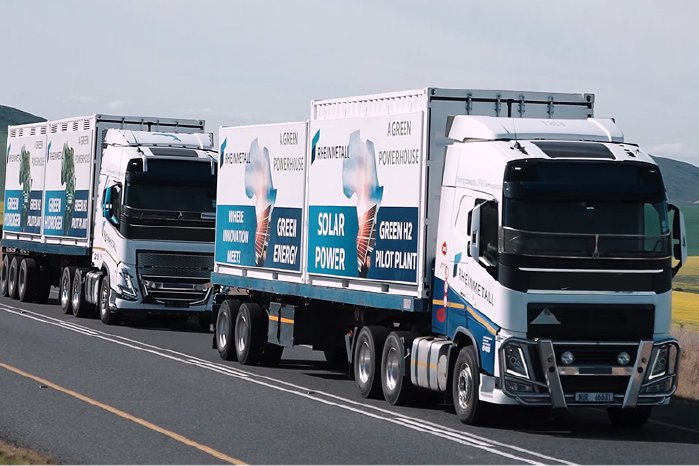The concept is based on electrolysis technology, in which water molecules are separated into hydrogen and oxygen. The electricity necessary for this is produced with solar panels, making it CO2-free. Wind and Hydropower can also be used to produce the required electricity. The green hydrogen produced in this way is gaseous, meaning that can be stored indefinitely and transported anywhere worldwide.
Developed by Rheinmetall, all the components of this modular system can be combined into a fixed stationary system mode as well as into mobile applications of various scopes. With larger mobile set-ups, such as field hospitals, the conversion of solar power, electrolysis, storage of the hydrogen produced, and fuel cell based electrical generation takes place in separate containers. The necessary modules can all be concentrated in a single container, operated by solar panels for producing electricity as well as water, thus further enhancing its potential for mobile operations. Mobile production of green hydrogen lends itself to industrial, private and expedition contexts as a means of generating power and heat. Byproducts such as oxygen can either be used for their own requirements or sold into the global commodity market. Basically speaking, the hydrogen produced by the system can either be kept in situ or transported to a different destination, meaning that it can be stored at a distant location for subsequent use.
Production volume can be tailored to meet individual requirements. A container solution consisting of four standard sea containers can supply power for 30 to 40 households. The different systems, whether for tent cities, field hospitals, or stationary solutions, enable not just the production of green hydrogen as a future energy source, but also self-sufficiency and maximum mobility in undeveloped places or in off-grid commercial applications where electricity is lacking.
This technology solves one of the great problems of the Energy Revolution, the ability to store and transport energy. But it is also a sustainable, secure source of power, including in undeveloped areas. As well as expanding Rheinmetall’s portfolio as a reliable energy partner, this modular system adds a further element to its hydrogen strategy: a self-sufficient, customizable, mobile solution. The Group now offers solutions for completely solar-powered energy production. It is also a global supplier of green hydrogen and complete turnkey solutions as well as large-scale stationary H2 factories in addition to the mobile modular solutions outlined above.
At its locations in South Africa, Rheinmetall offers turnkey industrial solutions for renewable energy, extending from the initial concept to final commissioning, coupled with full lifecycle support, training, maintenance, and operator models. Regardless of the individual use, key objectives here include cutting carbon emissions, gaining independence from energy suppliers, and adapting to the needs of the user, while simultaneously assuring low maintenance costs and adequate scope for meeting individual customer requirements.
The African Aerospace and Defence Exposition takes place every two years at AFB Waterkloof in Centurion, Gauteng, South Africa. A combined trade fair and air show, AAD Expo runs from 21 to 25 September 2022.



